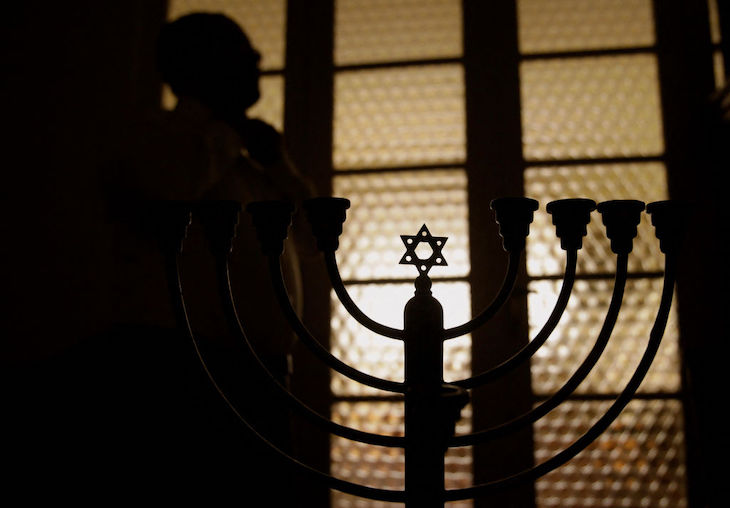I was in my early twenties when I found out that I’m half-Jewish. Until then, as far as I was aware, I was merely a lapsed Catholic embracing the secular life. (I abandoned the faith at the age of ten; my Catholic mother didn’t seem to mind.) My father, as I understood it, was Protestant. But one day he was chatting to me about his family background and dropped the bombshell that he had converted to Christianity in Budapest in the 1930s. His family was, in fact, Jewish, but with increasing anti-Semitism in Europe – courtesy of the Nazis – he had converted for pragmatic reasons, as did many other Hungarian Jews at the time. He explained that he had never before mentioned his Jewish past to me because it wasn’t relevant to my life, and that, because anti-Semitism is never far away, it could even have a potentially adverse effect on it.
I had to clear the dirt and leaves off their cracked gravestone in order to read the inscription
As for me, I was delighted with the revelation, clearly recognising that it made me more interesting to myself. But over the course of the decades, I have come to realise that it can be a tricky thing, being half-Jewish. Consider for a moment. Being a half-Jew means you are Jewish enough to feel ‘on your own skin’ the sorrow of the Holocaust, to be outraged by anti-Semitism, and to defend Israel and get attacked for it by its enemies. But not Jewish enough to partake of the enviably strong bonds and supportive social and professional networks that exist within Jewish communities.
This quandary brings to my mind the famous quip by Groucho Marx. When informed at an exclusive country club that the swimming pool was off-limits to Jews, he replied: ‘My daughter is only half-Jewish. Can she go in up to her knees?’ And there you have it. To be half-Jewish means being let in only up to your knees. It seems unfair, because while you don’t get the benefits, you do take the flak, and the flak has been pretty relentless since the outbreak of the war in Gaza.
I think that some Jewish people probably view us half-and-halfs as free agents and in no particular need of community backing. We are in the ‘mainstream’. But one can feel isolated out in that vast amorphous place. And it’s not as if we can call upon those other useful support systems – the ones for WASPs and toffs and churchy folk, Establishment elites, Old Boy networks – because we don’t belong to them either. So, free agent it is.
Do I feel Jewish? Well, I always opt for the smoked salmon bagel over the bacon sandwich. I can tell a Jewish joke with the correct inflections, shrugs and hand gestures. And I bawl my eyes out every time I watch Fiddler on the Roof. What’s more, I picked up a number of handy Yiddish words from my beloved father, which I still employ today whenever the need arises. Funnily enough, it never occurred to me while I was growing up that my dad used rather a lot of Yiddish words for a ‘goy’. He always called a scoundrel a ganef, while a decent person was a mensch, rubbish was dreck, and a slob (my dapper father deplored slobbishness) was described as schlamposh, a German-Yiddish-Hungarian concoction of his own.
As I know full well, none of this would cut much ice with fully-leaded Jews, as tradition has it that Jewishness can only be passed on through the maternal line. But I can recognise a genuine Jewish emotion when I have one.
Some years ago I made a pilgrimage to the vast Jewish cemetery on the outskirts of Budapest, where my paternal grandparents are buried. It has a memorial to the 600,000 Hungarian Jewish victims of the Holocaust. To enter this cemetery is to journey back to the once proudly flourishing world of Budapest Jewry of the late 19th and early 20th century – bankers and industrialists, business magnates, artists and scientists. There are fabulous Art Nouveau mausoleums built for prominent Jewish families, designed by celebrated architects of the era, and lavish tombs which have long fallen into decay.
My grandparents’ grave is in a remote and neglected corner and is anything but lavish. Antal Halász and his wife Jolán, née Glück, were not wealthy or prominent. He was a businessman but not a very successful one. Their marriage was unhappy and they separated, to be reunited only in death. They didn’t perish in the Hungarian Holocaust: she died of cancer the year before, in 1943, while he was rescued by his gentile business partner and lived until 1962. I had to clear the dirt and leaves off their cracked gravestone in order to read the inscription.
Standing beside this humble, ruined resting place, I realised that I am the last generation to have a meaningful connection to those two people. When I go, so do they, into the eternal void: the same place to which so many of their fellow Jews were consigned in 1944. The sadness of that thought was almost unbearable. And that is the half of me that is truly Jewish.






Comments